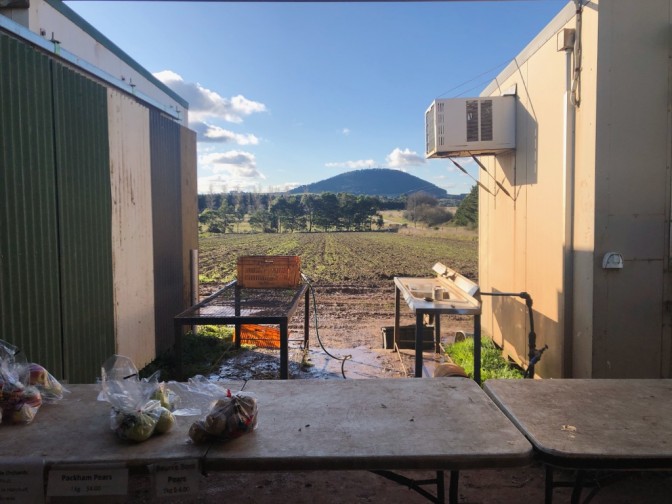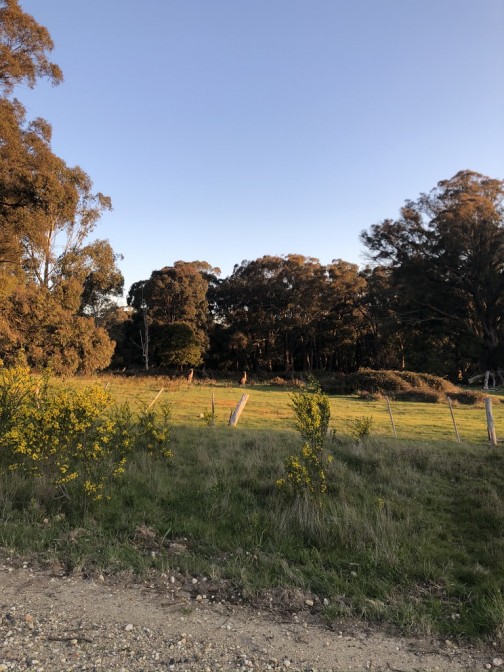'Flaneuring' regional Victoria during COVID-19
Savannah SupskiOn a windy and cold afternoon in late June, in western regional Victoria, I pulled my car over out of pure relief. I was met with what I had recently become accustomed to: ineffable beauty. I had driven a red dirt road over four one-way bridges and two hairpin turns, all in the middle of what seemed a cross between horticultural land and a national park. I was on top of a hill covered in sheep, and all I could see were the surrounding mountains and grasslands. In my back seat, bags of groceries from local farms.

Bungal, Victoria
A couple of months prior, I had lost my job, the lease on my apartment had ended in early June, and the degree I was studying had gone online for the unforeseen future. Like a majority of people across the world, I had no idea what was going to come next and, importantly, no idea if we were going to catch the novel coronavirus.
And so, newly engaged, my partner and I decided to pursue our long-term goal: living in the country. Moving to the country was something we imagined achieving after I finished my degree. But we had been given an expectational set of circumstances...almost as if the world had said, "Go, do!"
We weren't alone either. COVID-19 has produced a migration of city dwellers searching for a slower life in regional Australian towns. Reporting on this sudden migration, WahlquistWahlquist, C. (2020, August 20). The Covid exodus from the city: 'That's it, I'm calling the real estate agent'. The Guardian. humours a possible worldwide mid-life crisis as she interviews Australians searching for "affordable housing and better lifestyles."
I have always preferred the quiet of the country to the fast of the city. Although the country is just as dynamic as the city, it perhaps moves more slowly and welcomes the chance to stop, observe and connect. If you stroll in the CBD or stop for a gaze you can be sure to be sworn at, shoved or pushed aside. I wonder if it is only possible to flaneur city streets in earlier modernity? The need for constant growth and productivity is insatiable.
The slowness of regional Victoria, marked with the forced slowness of a global pandemic, created this opportunity for us. I had an open amount of time to gain knowledge of my new home. So I 'flaneured'. Although perhaps there is another word, more suited for a car?
Being a food-fanatic, my exploring focussed solely on food. I found a small store called The Farmgate Shop in Elaine. The store is housed in a shipping container and has food sourced from the local area, including meat that is produced by the owner. I found a hydroponic tomato farm, Yendon Gourmet Tomatoes, who have the best tasting tomatoes considering it was the middle of winter. There are eggs for $5 every couple of kilometres, potatoes and honey too. My favourite find is Spring Creek Organics, which sells fresh vegetables at prices much cheaper than the supermarkets (they also sell milk, cream and yogurt). I had regularly bought vegetables from Spring Creek Organic at farmers' markets in the city for the past couple of years, and now I could purchase them direct from the farm gate.

Spring Creek Organics
Studying a degree in Food Studies has opened my eyes to the cosmos of food. Most notably, it explores the intricacies of our current food system. In Australia, our food system is controlled by major supermarkets (Clibborn, S. (2019). It takes a village: Civil society regulation of employment standards for temporary migrant workers in Australian horticulture. The University of New South Wales Law Journal, 42(1), 242-268) (Rose, N. (2017). Community food hubs: an economic and social justice model for regional Australia?. Rural Society, 26(3), 225-237) This control leaves little room for small businesses and farmers to sell products, as they are pushed out by competitive pricing and unreasonable standards. So I was so excited to see that my food sourcing did not need to rely on the supermarket duopoly anymore. By looking for small independent farmers, I was also able to support farmers who are not producing on an industrial scale. Charles Massy(Massy, C. (2017). Call of the Reed Warbler. Australia: UQP.), champion of regenerative agriculture, explains that industrial agriculture is driven by two goals: the maximisation of production and the maximisation of profit. These goals have devastating effects on the earth. The industrial and corporatised systems pay no regard to the people, animals or plants they exploit.
It's been four months since we moved to our sleepy and slow regional town. We've chopped almost 5 cubic metres of firewood (and understood just how much wood 5 cubic metres is!), planted food, bought a whipper snipper. We've eaten at local restaurants, watched the spring lambs tumble and play, gawked at kangaroos with joeys in their pouches and echidnas slowly crossing the road and been saddened by wildlife lying still on the roadside. We only miss one thing: Our friends and family. Calls to mental health services doubled at the beginning of the last lockdown with loneliness, depression, and anxiety confronting Victorian residents (Boseley, M., & Davey, M. (2020, July 9). Calls to mental health services in Victoria double as strain of Covid-19 lockdown shows. The Guardian.).
Sustain's recent national Gardening Pandemic Survey has shown how gardening and engaging in nature can be a powerful self-care practice, among other things. For my friends and readers in Melbourne, regional Victoria looks forward to when you can heal yourselves with the abundant beauty of our country. Maybe a visit to a local farmers' market with the knowledge that you can meet the farmers very soon is an achievable goal to look forward to. Parks and backyards and edible balcony gardens might fill the void until then.
The kangaroos await you.

Mount Egerton golden hour
About the Author
Savannah Supski is currently studying a Bachelor of Food Studies at William Angliss. Her interests lie in food systems and the effects of capitalism on disadvantaged and minority peoples, especially Black, Indigenous, people of colour and the LGBTQIA+ community. She is a home cook inspired by Australian cooks: Stefano de Pieri, Maggie Beer, Stephanie Alexander and Kylie Kwong.
I would like to acknowledge the Wathaurong/Wadawurrung people, who are the traditional custodians of the land. The Wathaurong/Wadawurrung have cared for country for millennia. I would like to thank the elders past, present and emerging for the wealth of knowledge that is continued to be passed down through immense crisis and dispossession.
All photos taken by the author.
Resources:
Spring Creek Organics | 27 Kielys Rd, Navigators VIC 3352
Yendon Gourmet Tomatoes | 273 Harbours Rd, Yendon VIC 3352
The Farmgate Shop | 1 Settlement Rd, Elaine VIC 3334
Accredited Farmers Markets in Melbourne and Victoria
Resources for mental health support:
Lifeline: 13 11 14
Qlife for LGBTQIA+ community: 1800 184 527